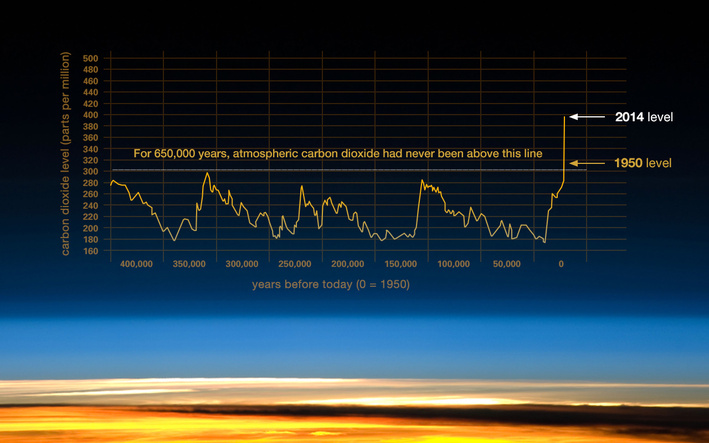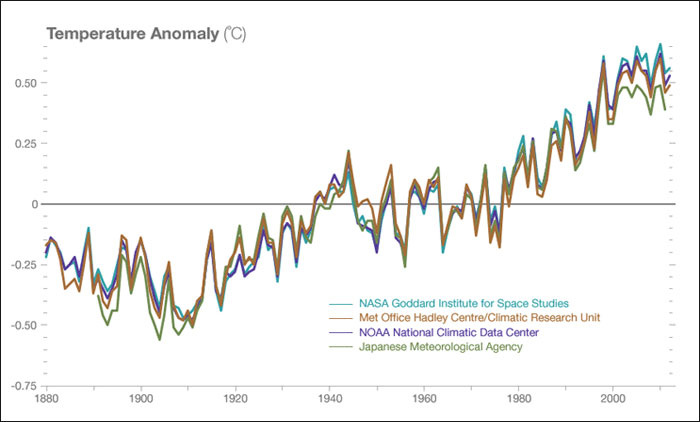We need to develop more, diverse, renewable ways to meet our growing energy needs. Even the most adamant of tree-huggers and climate-change deniers could agree on that. The question is the extent to which fossil fuels continue to be a source of that energy. There's a surprising number of folks out there who don't accept that human activity is causing global warming. 49 US Senators, for instance. And 40% of all Americans, according to a 2014 Gallup poll. Some don't believe global warming is occurring at all. Why are we so divided on this issue? How can we get past the divisiveness, and align on some positive action to take?
As I continue reading and thinking about this, I realize there’s more than one way to frame the issue. And how it's framed might impact the possibilities for agreement and action. Here's the "Climate Change Classic" frame: Climate change and carbon dioxide emissions:
Here's another frame: Population and energy:
It seems safe to make a couple of assumptions at this point:
The difference is the extent to which fossil fuels will continue to be a source of energy. And there are other ways to frame the issue – economics, health, morality, justice, etc. Ideally we could land on a common frame, and common language, to come together and take action. But if that's not possible, maybe we can at least agree on what's common to all the frames.
1 Comment
Of the problems plaguing our planet, which is the most serious? I’ve been doing some reading on this. Until I started digging in, I thought no one was talking about the environment. Turns out, if you do a bit of hunting around online, and “like” some pages on Facebook, there’s quite a lot of talk about the environment. Too much, almost. It’s challenging to sort through.
Based on my unscientific, look-til-your-eyes-glaze over, review of dozens on results of internet searches of “top environmental problems”, I can tell you that common top picks include overpopulation, global warming, water pollution, air pollution, lots of species going extinct, sea level rise, fracking, ocean acidification, deforestation, and melting glaciers. And then there are the ones you never heard of, like microfibers coming off our fleece jackets being the biggest source of plastic in the oceans. I could read on forever – and in some ways feel like I already have. But I’m going to put a stake in the ground here and try on the assumption that climate change is the biggest problem. And when I say biggest, I mean the one that most threatens human existence. NASA has a pretty compelling website on climate change. It acknowledges that some climate change happens naturally, due to the earth’s wobble, changes in the sun, and volcanoes erupting. But, NASA says there’s a scientific consensus that since around 1950, climate change has been happening at a rate much faster than can be explained by natural causes. Human activity (mainly using fossil fuels and other greenhouse gases) has drastically accelerated the level of atmospheric carbon dioxide, and that causes climate change. Climate change is a pretty solid bet as the biggest problem facing Earth. That’s partly because with climate change come a lot of freebies like rising sea levels; ocean acidification; glacial melt; extreme weather like droughts, heatwaves, floods and storms; disease and illness; and general messing with ecosystems, as the weather changes too quickly for species to adapt. But could climate change get so bad that it could actually cause human extinction? I haven’t yet found a reliable source for that (but have found many unreliable ones). Stay tuned. There is a LOT to learn about the environment to complete this project. Before I start learning it all, it’s time for some more stock-taking. It seems to make sense to do a brief assessment of what I know best: My own habits. Are my everyday behaviors harming the planet, even as I resolve to protect it? Could I stop myself even if I wanted to?
Must I really face this embarrassing question: Am I an Environmental Hypocrite? If so, can I legitimately purport to be making a positive impact overall, despite my individual negative impact? Ok, time to come clean (pun! See, the environment can be funny.). Scrutinize my own behaviors through an environmental lens. After just a shallow dip into the world of personal accountability for the environment, I must conclude that I am, indeed, not exactly living what I might end up preaching. Without any research, I already know it’s not in the best interests of the planet that I:
Ouch. A bit painful to see it all laid out like that. But now you know the worst about me. And I might have a sense of where to start. But wait! The goal is to make the biggest possible positive impact on the environment. Maybe I can do that even without changing my filthy personal habits. Must look further. The challenge, of course, is HOW to make a difference. First I’ll need to climb a steep learning curve, starting at the very bottom. What’s the problem? What are the issues? What’s being done already? Who’s doing it? Are they doing it well? What still needs to be done? Which sources of information are reliable for getting this info in the first place?
What’s the biggest problem? Is it global warming, carbon dioxide emissions, deforestation, the Great Ocean Garbage Patch, drought, wildfires, rising sea levels, traffic, overpopulation, greenhouse gases, failure to compost, fracking, littering, melting glaciers, urban sprawl, genetically modified organisms, plastics, overfishing, or an endangered species? (I secretly hope it’s an endangered species, as some of them are so darn cute.) And What’s the Fix? For whatever IS the biggest problem, what’s the best solution? Since I don’t even know the biggest problem, I can’t even speculate now. What Should My Role Be? Once I figure out the biggest issue, and the best solution, what should I do about it? Do I start with myself, my family, my home, my workplace, my neighborhood, my city, my state, my country, or the planet? Do I change my own living habits to become a model citizen for the environment? Do I tell all my friends about the environment – bring it up at every cocktail party, every Mom’s Night Out, every dinner gathering? Do I start a neighborhood environmental group? Do I get back into the practice of law, and take a legal approach to protecting the planet? Do I mobilize large-scale (or small-scale) grassroots political action? Make my town a model of environmental protection, then use it as an example to inspire others? Start a nonprofit? Start a clean energy company? Fundraise? Become a cog in the most effective wheel (organization, company, or leader) I can find? Write a book? Make a movie? Run for office? Organize a rally? Start some civil disobedience? Chain myself to a tree? Mobilize grassroots political action? |
Why this project?I just turned the big Five-Oh, and decided to dedicate the next decade of my life to helping the environment. Read more in the About section. Archives |




 RSS Feed
RSS Feed
